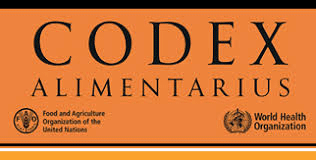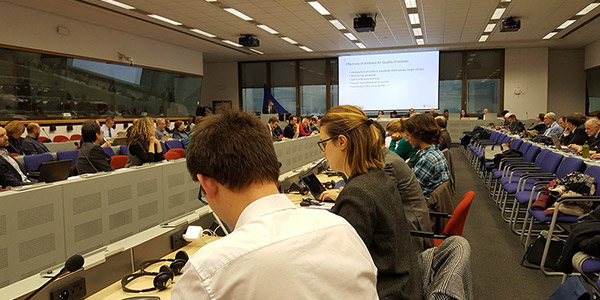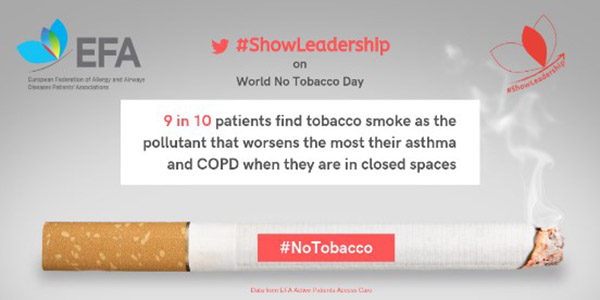Advocacy
Prevent: our right to live in healthier environments
Air quality #CleanAir

In 2019, air quality was again put into spotlight in the public sphere and policy discussions all over Europe. One important process was the official review of the two EU Ambient Air Quality Directives (AAQDs), two legislations that regulate the presence of five pollutants in the air and how public authorities collect and inform about their presence. EFA engaged in the process as a participant but also as a source of information representing allergy, asthma and COPD patients in Europe. We conveyed that while both directives have been partially effective, they do not fully protect our respiratory health. Therefore we reiterated in written and orally during the European Commission workshops that the AAQDs would need to (1) align with the World Health Organisation (WHO) Air Quality Guidelines (2) include biological particles such as pollen into future policies, and (3) ensure better access to real-time information on air quality.
That forward looking approach came through a European Parliament motion for a resolution ‘Clean Air for All: A Europe that Protects’. Adopted in March, the resolution frames the way towards better regulating the #AirWeBreathe, including indoors, and through a hard-sought EFA request to establish a compulsory indoor air quality certificate for all new and renovated buildings (#IAQCertificate).
At global level, EFA also took part in a call for comments to the “Global Action Plan for Healthy Lives and Wellbeing” organised by WHO. We stressed the need to generate more knowledge on the impact of air quality on human health as well as the reinforcement of the European Environment and Health process.
Tobacco

Europe still has the highest prevalence levels of tobacco use (29%), and smoking remains the deadliest, preventable, cause of premature death in the European Union, killing 700,000 people every year. As such smoking remains a major health issue, affecting primarily people with respiratory diseases, regardless if they are smokers themselves or not.
In 2019, EFA continued to actively advocate for policies that promote tobacco control, smoke cessation, and smoke-free environments – including protection from second-hand smoke. Tackling smoking in indoor and outdoor spaces became a central recommendation to policymakers in our Active Patients ACCESS Care Report and was also a key message during World No Tobacco Day in which EFA and national members were highly active.
In support of scientific research as the basis of advocacy, we also brought the patients’ perspective to the final conference of the “TackSHS” research project, which looks into the effects of exposure to smoke and specifically, second hand smoke on human respiratory health. Meanwhile, we publicly opposed the promotion of tobacco industry by media, and countered reports by the tobacco lobby organisation that painted a rosy picture for the impact of tobacco on health and claimed an overregulation of tobacco use at European level.
Food labelling

The prevalence of food allergy in Europe is increasing, while public awareness and understanding remains relatively low. This is why, throughout 2019, EFA gave a renewed focus on issues relating to food allergen labelling and information.
In April we launched the social media campaign #DetectiveFood to share views and experiences with food allergy. The campaign served to support EFA flagship project FoodDETECTives and was presented along with burning topics such as Precautionary Allergen Labelling, novel foods, and food certificates such as “Vegan” to the European Commission DG-Santé.

At EU level, EFA also continued to provide the allergy patient perspective to the European Food Safety Authority (EFSA), as we are registered “NGO stakeholder”. We responded to the public consultation on the introduction of complementary food (including allergens such as egg and seafood) into an infants’ diet. Among others, EFA highlighted the need for clear guidance on the appropriate introductory age of both babies and breast-feeding mothers. We also took active part in EFSA NGO Roundtable and represented food allergy patients at EFSA’s Third Annual Stakeholder Forum, in Italy.

At global level, EFA was granted an observer status in the Food and Agricultural Organisation (FAO) Codex Alimentarius Committee, the international body drafting standards, guidelines and codes of practice relating to food safety. From now on, we will be able to follow closely the global developments and dynamics, with the recognition to contribute to discussions in the area of food labelling and hygiene.
Chemicals

Chemicals are everywhere: in textile, chemicals, or toys! While useful, chemicals can trigger allergies and respiratory disease, posing a real health risk to consumers. Within a context where scientific knowledge and regulation lag behind industrial practice, EFA follows the regulatory process as official stakeholder to the European Chemicals Agency (ECHA).

In 2019, EFA advocated for the need for clear, on-pack information of the new 62 fragrances allergens recognised by the European Commission. In the ECHA public consultation on skin sensitisers often present in textile and leather products, we provided our insight and support to the European Environmental Bureau in their calls for the restriction of these substances as potentially harmful for consumers with skin allergies. Finally, we also brought the patients perspective at ECHA’s Annual Workshop in March, and the EU Chemicals Policy 2030 Conference and the Safer Chemicals Conference in Helsinki, both in May.
Thank you!
Sincere thanks for their valuable contributions to the EFA responses in official public consultations to the Food Allergy and the Allergy & Asthma Working Groups/ Food Allergy Italia, the Belgian Asthma and Allergy Association, the Spanish Association of People with Food and Latex Allergy, and the Swedish Asthma and Allergy Association, as well as the European Academy of Allergy and Clinical Immunology, for their scientific input.


